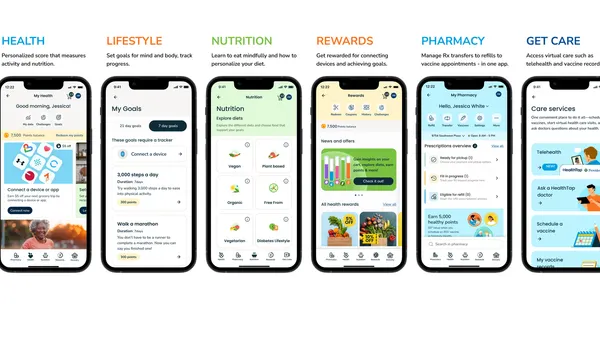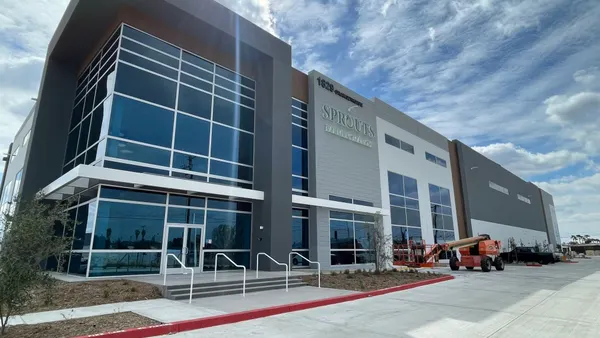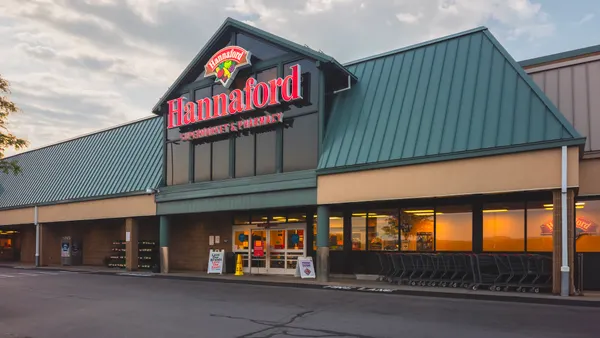Reports of violence at grocery stores continue to pour in, with mask mandates fueling some of the recent incidents.
Just this summer, employees at Community Foods Market in Oakland, California, were verbally and physically assaulted by customers after bringing back its mask mandate. A harrowing viral video surfaced of a man at a Ukrainian supermarket using an ax to damage checkout stations after his wife was denied service because she was not wearing a face covering. A shooter killed a cashier and injured two people at Big Bear Supermarket in Decatur, Georgia, in June after allegedly arguing with the cashier over the store's face mask policy.
As grocers continue to see violence erupt at their stores, facilities and parking lots, the industry’s largest trade organization is providing a new resource to promote workplace safety.
The Food Industry Association (FMI) told Grocery Dive it launched a portal this week for its members to access online workplace violence training developed by The Power of Preparedness (TPOP).
The partnership with TPOP builds on FMI’s recent efforts to make workplace safety a top priority in the grocery industry. The trade group held a session on workplace violence during its summer executive conference in June and has published guides, including a crisis management one focused on de-escalation last summer and its Active Shooter Guideline in 2018.
“We wanted to be able to get to market [and] get a resource available as early as possible to our members that is a basic resource. … This is foundational work to bring the entire industry training as quickly as possible,” said Doug Baker, vice president of industry relations for FMI.
What the training entails
The training consists of seven modules, which each have short videos, several one-question quizzes and a main takeaway. It covers what workplace violence is, prevention measures, verbal de-escalation tactics, active assailant preparedness and situational awareness. The active assailant preparedness section explains the principles of “run, hide, fight” and advice for how people can decide what to do. It took this Grocery Dive journalist roughly one hour to complete the training, which was provided for free for reporting purposes, not including breaks between the modules.
“TPOP’s training goes even further beyond survival,” Baker said.
Because active shootings often happen in a span of minutes, with the assailant usually aiming to kill or injure as many people as possible in a short period of time, how people react can greatly impact the outcome of the event, said William Flynn, TPOP's co-founder and chief strategy officer. He noted the training was designed to maximize attention retention by adults and incorporated de-escalation techniques for frontline workers after companies requested it.
With training, people can learn to recognize behavioral anomalies that could indicate violent behavior, which can lead people to report suspicious behavior, Flynn said.
TPOP's virtual training is on-demand and accessible for a year. The training usually costs $14 per person for one year, but FMI members will get 15% off and can explore enterprise pricing. It can work for a single-store operator or for a company with tens of thousands of employees, Baker said.
Baker said FMI chose to partner with TPOP because of the company’s history working with related industries and the safety and law enforcement expertise of its founders and trainers, which includes people who have worked for police departments around the country, the FBI and the Department of Homeland Security.
The trade group also liked that the training can be customized. For example, because speakers in the videos were filmed in front of a green screen, different backgrounds can get inserted, like an image of a grocery store aisle. New speaker intros to each module can get filmed and added to include high-level executives from a specific company or companies, and tailored slides can be inserted to go over industry-specific safety tactics.
FMI is aiming for a “top-down approach” that will get executives, human resources and communications professionals, and staff in asset protection roles at large member companies to implement the training and incentivize employees to take it, said Heather Garlich, senior vice president of communications, marketing and consumer/community affairs at FMI.
The main challenges the trade group expects are making sure people know about the training partnership and explaining why it’s relevant to them. “Frankly, one of the biggest issues that we deal with is, most people don't think that it's ever gonna happen to them,” Baker said.
Thinking through safety
To get companies considering how a violent incident could impact their businesses, Flynn recommends they conduct a risk assessment based on three elements: the probability of an event happening, the vulnerability of a facility and the consequences of an incident happening. With stores serving as an open place for mass gatherings, grocers already face potentially high vulnerability, Flynn said.
FMI has not surveyed its membership to find out how many already offer workplace violence training. But for those that have their own training, Baker said they can use TPOP's resources to benchmark against their own.
Flynn said he's seeing more companies starting to require some kind of training on workplace violence or active shooter incidents on an annual basis and that grocers are showing strong interest as FMI works to spotlight how training and other safety measures can potentially save lives.
"Frankly, one of the biggest issues that we deal with is, most people don't think that it's ever gonna happen to them."

Doug Baker
Vice president of industry relations, FMI
For grocers who offer training, frequency varies from company to company, with most requiring it upon hire or on an annual basis, according to FMI and TPOP. Baker said some retailers provide it twice a year, while Flynn said he’s aware of one big-box retailer holding training on a quarterly basis. “We are seeing that more and more companies are doing this training on a more frequent basis,” Flynn said.
The Giant Company requires team members to complete active shooter training annually, while Target offers team member training, partnerships with law enforcement, technology and ongoing reviews of its security measures as part of its "comprehensive approach," spokespeople for the companies previously told Grocery Dive.
Both Baker and Flynn stressed the importance of building up “muscle memory” of the principles and options that can help save lives. “The body can’t go where the mind has never been,” Baker said.
As TPOP’s training notes, workplace violence can encompass verbal assaults as well as physical ones, and weapons can include hands, knives and other objects. FMI is looking to alter how people think about workplace violence, broadening the focus beyond mass shootings by strangers to other types of weapons and perpetrators. “To the extent that we can start saying ‘active assailant’ I think is really important because it’s not always a gun,” Baker said.
While Flynn said there’s no perfect security plan, he said having a mix of internal- and external-facing safety measures, like cameras, security personnel and signage, can boost preparedness among workers and customers. For example, there’s an FMI member that uses general overhead announcements to remind people to identify the closest emergency exits and bring additional awareness to store safety, Baker said.
Grocers may want to create or reassess their safety measures as returning mask mandates raise additional concerns and questions around the safety of workers and patrons. “What we've witnessed during 2020 and COVID was an increasing number of incidents in the workplace based on mask-wearing, based on social distancing, based on the fact that violence is often triggered by stress, anxiety, depression and other emotional issues," Flynn said.
FMI, the National Grocers Association, the National Retail Federation and six other industry groups wrote in a letter earlier this month to the Centers for Disease Control and Prevention, Department of Health and Human Services and the Occupational Safety and Health Administration (OSHA) that store employees are not prepared to enforce health restrictions. They asked the health officials to publicly state that jurisdictions with masks mandates should not place enforcement on businesses.
"During the past year and a half, however, some local ordinances put the onus of mask enforcement on retail businesses. These requirements put employees in perilous situations as mask-wearing became a heated and politicized issue. ... Preserving the safety and well-being of retail employees is imperative. In fact, retail employees typically are trained not to confront shoplifters," the letter said.
As COVID-19 restrictions increase amid the surge of the delta variant, Baker surmised grocers are wondering if violence might increase at their stores and facilities. “We're going to suggest that customers wear a mask, but we certainly don't want to put our workers in front of harm’s way where they might be part of a violent situation,” Garlich said, adding that FMI is suggesting its members do more de-escalation training.
In response to OSHA releasing guidance last week that vaccinated workers in areas of substantial or high community transmission should wear masks to protect unvaccinated workers, the United Food and Commercial Workers International Union said in a statement it's a "step in the right direction, but still fails to fully protect the millions of American workers in grocery stores and meatpacking plants."
FMI wants to give grocers the resources to feel fully prepared if ever confronted with a potentially violent situation.
"These situations [of workplace violence] — we're not having fewer of them, we're having more," Baker said.












